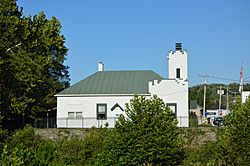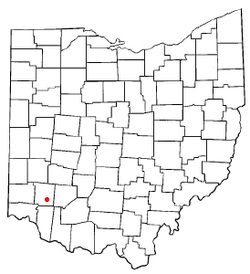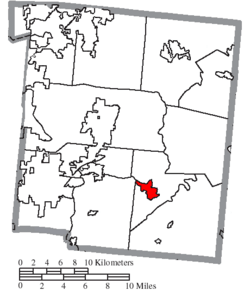Morrow, Ohio facts for kids
Quick facts for kids
Morrow, Ohio
|
||
|---|---|---|
|
Village
|
||

Village Hall
|
||
|
||

Location of Morrow, Ohio
|
||

Location of Morrow in Warren County
|
||
| Country | United States | |
| State | Ohio | |
| County | Warren | |
| Area | ||
| • Total | 2.11 sq mi (5.45 km2) | |
| • Land | 2.04 sq mi (5.28 km2) | |
| • Water | 0.07 sq mi (0.18 km2) | |
| Elevation | 643 ft (196 m) | |
| Population
(2020)
|
||
| • Total | 2,049 | |
| • Density | 1,005.89/sq mi (388.36/km2) | |
| Time zone | UTC−5 (Eastern (EST)) | |
| • Summer (DST) | UTC−4 (EDT) | |
| ZIP Code |
45152
|
|
| Area code(s) | 513 | |
| FIPS code | 39-52374 | |
| GNIS feature ID | 2399400 | |
| Website | www.vil.morrow.oh.us/ | |
Morrow is a small village located in Salem Township, Warren County, Ohio, in the United States. In 2020, about 2,049 people lived there.
Contents
History of Morrow Village
Morrow was officially planned and laid out in 1845. This happened when a railroad line was built to reach that area. The village was named after Jeremiah Morrow, who was the 9th Governor of Ohio. A post office has been open in Morrow since 1845, helping people send and receive mail for a very long time.
Geography and Location
Morrow is located in the state of Ohio. The United States Census Bureau says the village covers about 1.97 square miles (5.10 square kilometers) in total. Most of this area, about 1.93 square miles (5.00 square kilometers), is land. A small part, about 0.04 square miles (0.10 square kilometers), is water.
Population Changes Over Time
The number of people living in Morrow has changed quite a bit over the years. Here's a look at the population counts from different censuses:
| Historical population | |||
|---|---|---|---|
| Census | Pop. | %± | |
| 1850 | 459 | — | |
| 1860 | 720 | 56.9% | |
| 1870 | 708 | −1.7% | |
| 1880 | 946 | 33.6% | |
| 1890 | 842 | −11.0% | |
| 1900 | 869 | 3.2% | |
| 1910 | 832 | −4.3% | |
| 1920 | 803 | −3.5% | |
| 1930 | 738 | −8.1% | |
| 1940 | 840 | 13.8% | |
| 1950 | 1,137 | 35.4% | |
| 1960 | 1,477 | 29.9% | |
| 1970 | 1,486 | 0.6% | |
| 1980 | 1,254 | −15.6% | |
| 1990 | 1,206 | −3.8% | |
| 2000 | 1,286 | 6.6% | |
| 2010 | 1,188 | −7.6% | |
| 2020 | 2,049 | 72.5% | |
| U.S. Decennial Census | |||
Morrow's Population in 2010
In 2010, the census showed that 1,188 people lived in Morrow. There were 455 households, which are groups of people living together. About 36.3% of these households had children under 18 years old. The average age of people in the village was 39 years old.
Education in Morrow
Students in Morrow attend schools within the Little Miami Local School District. For reading and learning, the Salem Township Public Library is located right in the village. It's a great place to borrow books and find information.
Music and Popular Culture
Morrow is famous for being the subject of a fun song called "I Want to Go to Morrow". The song plays on words, as "to Morrow" sounds like "tomorrow." It's about someone who wants to take a train to the village of Morrow and then return "tomorrow" night. An early version of this song was recorded in 1903. Later, the popular folk group The Kingston Trio also recorded it.
Notable People from Morrow
Several interesting people have connections to Morrow:
- Merie Earle – An actress known for her roles in movies and TV shows.
- Earl Fuller – A pioneer jazz bandleader from early American jazz music.
- Mark Whitacre – An FBI informant who played a role in a famous case.
See also
 In Spanish: Morrow (Ohio) para niños
In Spanish: Morrow (Ohio) para niños


